This story of Da Vinci’s lute might be chosen as a parable of his achievement. Art and science were never separated in his work; and both were not unfrequently subservient to some fanciful caprice, some bizarre freak of originality. Curiosity and love of the uncommon ruled his nature. By intuition and by persistent interrogation of nature he penetrated many secrets of science; but he was contented with the acquisition of knowledge. Once found, he had but little care to distribute the results of his investigations; at most he sought to use them for purposes of practical utility.[237] Even in childhood he is said to have perplexed his teachers by propounding arithmetical problems. In his maturity he carried anatomy further than Delia Torre; he invented machinery for water-mills and aqueducts; he devised engines of war, discovered the secret of conical rifle-bullets, adapted paddle-wheels to boats, projected new systems of siege artillery, investigated the principles of optics, designed buildings, made plans for piercing mountains, raising churches, connecting rivers, draining marshes, clearing harbours.[238] There was no branch of study whereby nature through the effort of the inquisitive intellect might be subordinated to the use of man, of which he was not master. Nor, richly gifted as was Lionardo, did he trust his natural facility. His patience was no less marvellous than the quickness of his insight. He lived to illustrate the definition of genius as the capacity for taking infinite pains.
While he was a boy, says Vasari, Lionardo modelled in terra-cotta certain heads of women smiling. This was in the workshop of Verocchio, who had already fixed a smile on David’s face in bronze. When an old man, he left “Mona Lisa” on the easel not quite finished, the portrait of a subtle, shadowy, uncertain smile. This smile, this enigmatic revelation of a movement in the soul, this seductive ripple on the surface of the human personality, was to Lionardo a symbol of the secret of the world, an image of the universal mystery. It haunted him all through his life, and innumerable were the attempts he made to render by external form the magic of this fugitive and evanescent charm.




